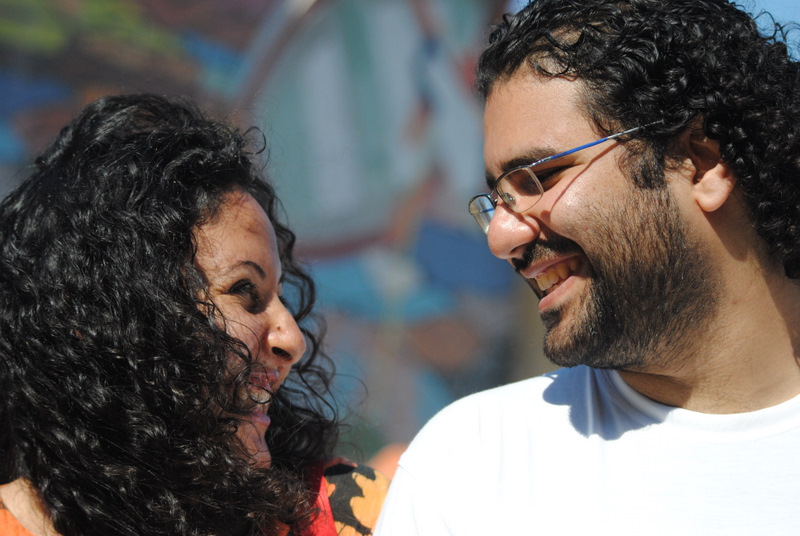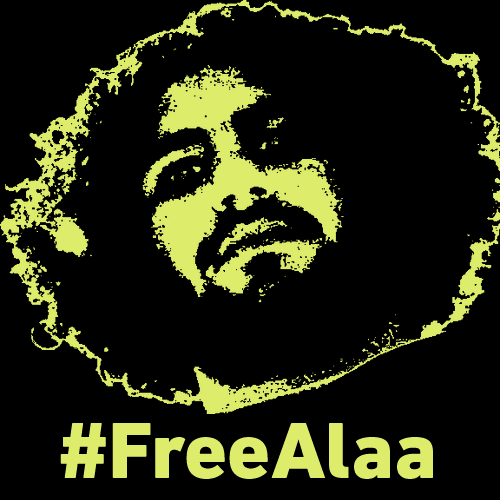
Alaa and his wife, Manal Hassan. Photo by Lilian Wagdy via Wikimedia Commons (CC BY 2.0)
Compiled and written by Manal Hassan, Mostafa Mohie, Lina Attalah, Amira Al Hussaini, Katherine Maher, and Ellery Roberts Biddle.
In June, Egyptian blogger and leading democracy advocate Alaa Abd El Fattah was convicted of violating a controversial protest law that prohibits unauthorized demonstrations and attacking a police officer. He was sentenced in absentia to 15 years in prison in June 2014 along with 24 other activists.
This is the latest in a series of legal threats that the activist has faced over the last three years. Reporting on the case, Reuters called Alaa an “anti-Mubarak activist.” This was true, but incomplete. Alaa is an activist for social justice, dignity, and human rights; anti-Mubarak, but also anti-SCAF, anti-Morsi, and anti-Sisi. His is a voice for freedom and against abuses of power.
Alaa rose to fame with the hype of the Egyptian blogosphere in the beginning of the millennia, the stars of which have been mostly young middle-class Egyptians. He believed in this new wave of activism and created with Manal, his partner, the famous Omraneya aggregator, which collected and archived blog entries and which was at times the house of alternative expression and at others the amplifier of muted voices.
While he spent years building websites around causes and campaigns and developing Arabization tools to make that sea of knowledge accessible, he sat back and observed how our social and political work is evolving on a multiplicity of levels: organization, the production of narrative, and ambition. He would talk about this evolution, and eventually write about it, but most importantly, he was actively thinking of how Internet tools should serve these changes.
Contents
- 1 Because of his activism, Alaa has been jailed or investigated under every Egyptian head of state who has served during his lifetime. In 2006, he was arrested for taking part in a peaceful protest. In 2011, he spent two months in prison, missing the birth of his first child. In 2013, he was arrested and detained for 115 days without trial.
- 2 TIMELINE for Shura Council Case Against Alaa
- 3 November 11, 2014: Alaa is scheduled to appear in court
- 4 October 27, 2014: Alaa is arrested upon arrival for court appeal
- 5 September 15, 2014: Alaa is released on bail
- 6 August 18, 2014: Alaa begins hunger strike
- 7 June 11, 2014: Defendants are issued a guilty verdict in absentia
- 8 March 23, 2014: Both defendants are released on bail
- 9 December 9, 2013: Abd El Fattah and Abd El Rahman referred to Egypt's Criminal Court
- 10 December 4, 2013: Some defendants are released, others remain behind bars
- 11 November 28, 2013: Alaa is arrested and detained
- 12 Get Involved
- 13 Advox Coverage of Alaa Abd El Fattah
- 14 GV Face: Alaa Abd El Fattah and Maryam Al Khawaja on Hunger Strikes, Jail-time, and Activism in Egypt and Bahrain Oct. 10, 2014
- 15 Egyptian Blogger Alaa Abd El Fattah Released on Bail Sept. 15, 2014
- 16 Advocates Petition UN for Action on Jailed Egyptian Blogger Alaa Abd El Fattah Aug. 22, 2014
- 17 Prominent Egyptian Activist Alaa Abdel Fattah Goes on Hunger Strike Aug. 20, 2014
- 17.1 Netizen Report: Acclaimed Egyptian Blogger Gets 15 Years in Jail, Sentenced in Absentia June 11, 2014
- 17.2 Egyptian Blogger Alaa Abd El Fattah Released on Bail Mar. 24, 2014
- 17.3 100 Days in Prison Without Trial: The Story of Alaa Abd El Fattah Mar. 6, 2014
- 17.4 Statement: Release Alaa Abd El Fattah And All Unjustly Detained In Egypt Jan. 23, 2014
- 17.5 Award-Winning Egyptian Activists Receive One-Year Suspended Sentence Jan. 10, 2014
- 17.6 Prison Flees: Reflections on Alaa, Activism, and Community Jan. 9, 2014
- 17.7 On Alaa, Learning, and the Struggle Jan. 9, 2014
- 17.8 Egyptian Activist Alaa Abd El Fattah Arrested — Again Nov. 29, 2013
Because of his activism, Alaa has been jailed or investigated under every Egyptian head of state who has served during his lifetime. In 2006, he was arrested for taking part in a peaceful protest. In 2011, he spent two months in prison, missing the birth of his first child. In 2013, he was arrested and detained for 115 days without trial.
These latest sentences borne by Alaa and the 24 others are the longest yet in a string of crackdowns on freedom of expression, assembly, and opinion in the country. The protest law has been used to jail other prominent activists, including outspoken human rights lawyer Mahienour El-Massry, and April 6 movement founder Ahmed Maher. In June, three Al Jazeera journalists were sentenced to seven and ten years in prison for “reporting false news.”
Activists in Egypt believe Alaa's case and others are merely political in nature, and meant to keep prominent activists behind bars while intimidating others to keep them away from the political process.
TIMELINE for Shura Council Case Against Alaa
November 11, 2014: Alaa is scheduled to appear in court
(Pending)
October 27, 2014: Alaa is arrested upon arrival for court appeal
Alaa appeared in court on Oct. 27, 2014, for a scheduled session concerning the appeal of his criminal case. He was arrested upon arrival.
September 15, 2014: Alaa is released on bail
Abd El Fattah was released from prison, on bail, following a ruling by the Cairo Criminal Court. After an appeal by his lawyers, Abd El Fattah was issued a retrial in August 2014. On Sept. 15, 2014, the presiding judge recused himself from the case after an incident last week, in which the prosecution presented a video depicting Manal Hassan, Abd El Fattah’s wife, dancing. Taken from Hassan’s laptop, which confiscated by police when Abd El Fattah was arrested and taken from his family’s home in November of 2013, the video bears no discernible relationship with his political activities.
August 18, 2014: Alaa begins hunger strike
An explanation from his family, posted on Facebook, read: “Alaa has begun an open-ended hunger strike to challenge his third detention since Jan 25, this hunger strike comes on heels of news of his father's deteriorating health condition and continued imprisonment of his sister Sanaa since June 21st. Alaa mentioned to his family that his hunger strike stems out of a decision that he will no longer cooperate with the country's broken injustice system.”
June 11, 2014: Defendants are issued a guilty verdict in absentia
The defendants were told that Wednesday's case would be dedicated to hearing witnesses and reviewing evidence presented by the prosecutor against the defendants. But the judge issued his ruling in absentia in an early session, bypassing witnessing, a statement from prosecutor, and defense statements. Meanwhile, the defendants And El Fattah, Wael Metwally and Mohamed al-Nouby were present outside of the courtroom while the case was taking place. According to their families, the defendants were not allowed inside the court until the session was over. After the sentence was pronounced, they were arrested. The implications of a rule in absentia include handing a maximum sentence and facilitating the immediate arrest of defendants, most notably Abd El Fattah among them.
March 23, 2014: Both defendants are released on bail
Abd El Fattah was released from Tora Prison on bail after spending 115 days behind bars, along with Abd El Rahman.
December 9, 2013: Abd El Fattah and Abd El Rahman referred to Egypt's Criminal Court
The case was referred to the Criminal Court. It took four months for the Court to set a hearing date for the case, during which time Abd El Fattah and Abd El Rahman remained in prison. Under Egyptian law, a defendant is typically only held in pre-trial detention if it is believed that he or she has tampered with evidence or threatened witnesses. There has been no indication that either defendant has engaged in this type of activity.
Abd El Fattah’s attorney sought to appeal his client’s detention in December of 2013, but this was denied.
The defendants’ lawyers in the Shura Council case demanded a withdrawal of the court's judges, a legal measure to avoid conflict of interest, since there is a direct dispute between the main judge Mohamed al-Feqy and Abd El Fattah and his lawyer Mohamed Ali Taha. Taha had filed a complaint with the Ministry of Justice in 2005 against Feqy for initiating fraudulent practices in the parliamentary elections. Abd El Fattah had protested in solidarity with Taha at the time, demanding that Feqy and other judges accused of fraud be placed under investigation. But the Court of Appeals rejected the demand for the judge’s withdrawal.
December 4, 2013: Some defendants are released, others remain behind bars
Twenty-three defendants in the case were released, while Abd El Fattah remained in prison for four months, alongside Ahmad Abd El Rahman. Witnesses and other defendants have repeatedly confirmed that Abd El Rahman didn't participate in the protest, but was just passing by Qasr al-Aini street on his way back from work. He stopped to watch what was happening and when he saw a girl being arrested by a policeman, he tried to defend her. Yet he faces the same charges as the other defendants.
November 28, 2013: Alaa is arrested and detained
Alaa Abd El Fattah was taken from his home and arrested under Egypt’s newly-approved Protest Law, for allegedly organizing a protest that took place before the Upper House of Parliament, known as the Shura Council, on November 26. Despite the fact that Abd El Fattah had issued a statement promising to turn himself in, a warrant was issued for his arrest by the public prosecutor.
The protest in question, which sought to reject the constitutional stipulations on the military trials of civilians, was organized by the “No to Military Trials of Civilians” group. Members of the group filed this information with the public prosecutor in order to claim responsibility for the event. Yet the prosecutor maintained his assertion and charged Abd El Fattah with organizing the protest, assaulting a police officer and stealing his walkie-talkie. The second and third charges issued allowed the prosecutor to refer the case to the nation’s criminal court, where decisions cannot be appealed.
This page will be updated as more information is made available about Alaa's legal circumstances and general well-being.
Get Involved
Tweet and follow the #FreeAlaa hashtag, join the multilingual Free Alaa Facebook group and use these images to join advocates calling for justice in Alaa’s case.
Advox Coverage of Alaa Abd El Fattah
GV Face: Alaa Abd El Fattah and Maryam Al Khawaja on Hunger Strikes, Jail-time, and Activism in Egypt and Bahrain Oct. 10, 2014
Egyptian Blogger Alaa Abd El Fattah Released on Bail Sept. 15, 2014
Advocates Petition UN for Action on Jailed Egyptian Blogger Alaa Abd El Fattah Aug. 22, 2014
Prominent Egyptian Activist Alaa Abdel Fattah Goes on Hunger Strike Aug. 20, 2014
Netizen Report: Acclaimed Egyptian Blogger Gets 15 Years in Jail, Sentenced in Absentia June 11, 2014
Egyptian Blogger Alaa Abd El Fattah Released on Bail Mar. 24, 2014
100 Days in Prison Without Trial: The Story of Alaa Abd El Fattah Mar. 6, 2014
Statement: Release Alaa Abd El Fattah And All Unjustly Detained In Egypt Jan. 23, 2014
Award-Winning Egyptian Activists Receive One-Year Suspended Sentence Jan. 10, 2014
Prison Flees: Reflections on Alaa, Activism, and Community Jan. 9, 2014
On Alaa, Learning, and the Struggle Jan. 9, 2014
Egyptian Activist Alaa Abd El Fattah Arrested — Again Nov. 29, 2013

